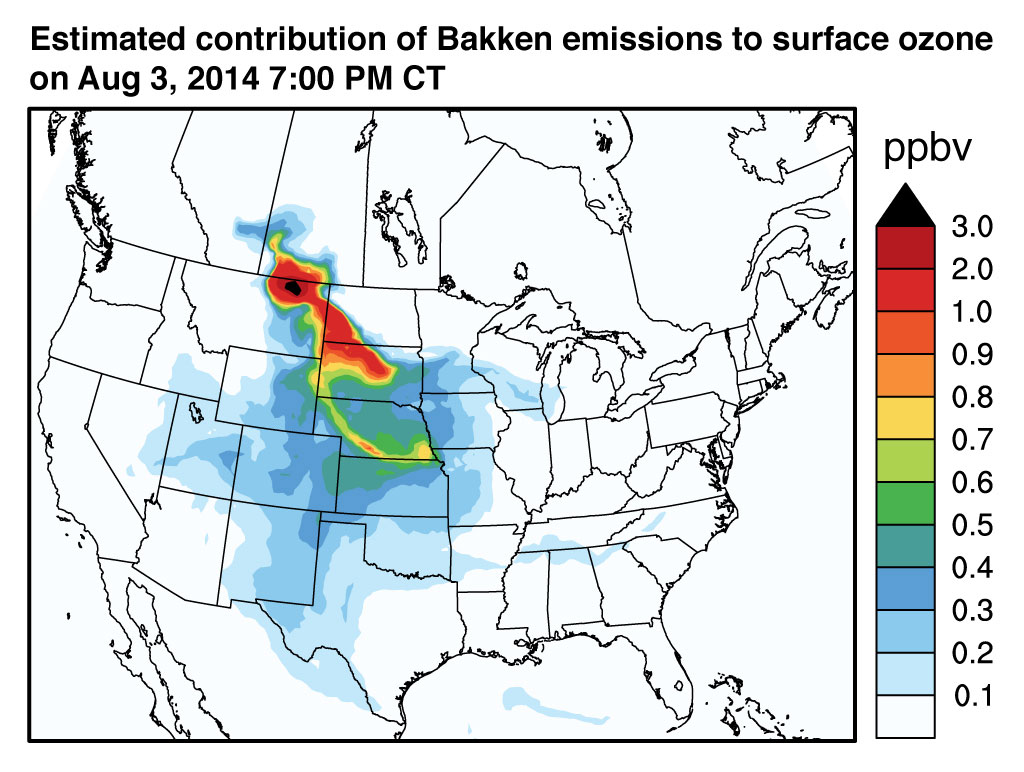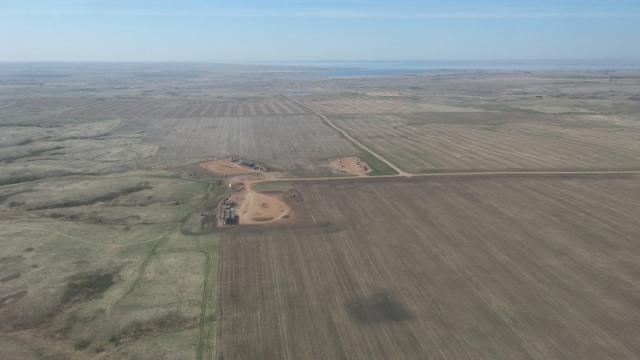A single shale oil field in the United States is responsible for a significant upsurge in global atmospheric levels of ethane, a dangerous gas that has been linked to climate change and pollution. It’s yet more evidence that fracking is screwing up our planet.
Researchers from the University of Michigan have determined that the Bakken Formation — an oil and gas field in North Dakota and Montana — is spewing about two per cent of the planet’s ethane into the atmosphere. That translates to about 250,000 tonnes each year. This explains why ethane levels suddenly began to increase after years of steady decline. The scientists described their findings in a new paper in Geophysical Research Letters,

A snapshot from a simulation of how Bakken oil field hydrocarbon emissions including ethane affect North American ground-level ozone concentrations. (Image: Lee Murray, NASA GISS/Columbia University).
“Two per cent might not sound like a lot, but the emissions we observed in this single region are 10 to 100 times larger than reported in inventories,” lead author Eric Kort said in a statement. “They directly impact air quality across North America. And they’re sufficient to explain much of the global shift in ethane concentrations.”
Ethane is a greenhouse gas, and the third-largest contributor to human-caused global warming after carbon dioxide and methane. The gas reacts with sunlight and other molecules in the atmosphere to form ozone. It can cause respiratory problems, eye irritation and other ailments, while also damaging crops. When levels get too high, safety advisories warn people to stay indoors.
This latest upsurge in ethane is troubling because global atmospheric levels of this gas had been decreasing from 1984 to 2009. Ethane escapes into the atmosphere via leaks caused by fossil fuel extraction and processing. The noticeable downswing in ethane emissions was attributed to less venting and flaring of gas from oil fields, among other factors. But in 2010, European scientists noticed a significant uptick, which they blamed on the burgeoning practice of hydraulic fracturing, or “fracking”, in the United States. Fracking is the process of drilling and injecting fluid into the ground at high pressure to fracture shale rocks, which releases the gas and oil inside.
To determine if fracking was the reason behind the upswing, the Michigan researchers flew over the Bakken Formation and sampled the air in May 2014. This particular oil field was a good place to start: from 2005 to 2014, oil production at Bakken jumped by a factor of 3500, and gas production by 180 (though production has plateaued in recent years). Their measurements showed that the field’s ethane emissions — about 0.23 teragrams per year — cancel out about half of the global decline rate.
“These findings not only solve an atmospheric mystery — where that extra ethane was coming from — they also help us understand how regional activities sometimes have global impacts,” said NOAA environmental scientist and study co-author Colm Sweeney. “We did not expect a single oil field to affect global levels of this gas.”
This revelation is sure to inflame an already heated debate about the practice of fracking, which has already been linked to ground and surface water contamination, air and noise pollution and even earthquakes.
[Geophysical Research Levels (pdf)]
Top: Researchers flew over the Bakken oil field to gather data about emissions of ethane, a hydrocarbon gas that can damage air quality and impact climate. (Image: Eric Kort)
